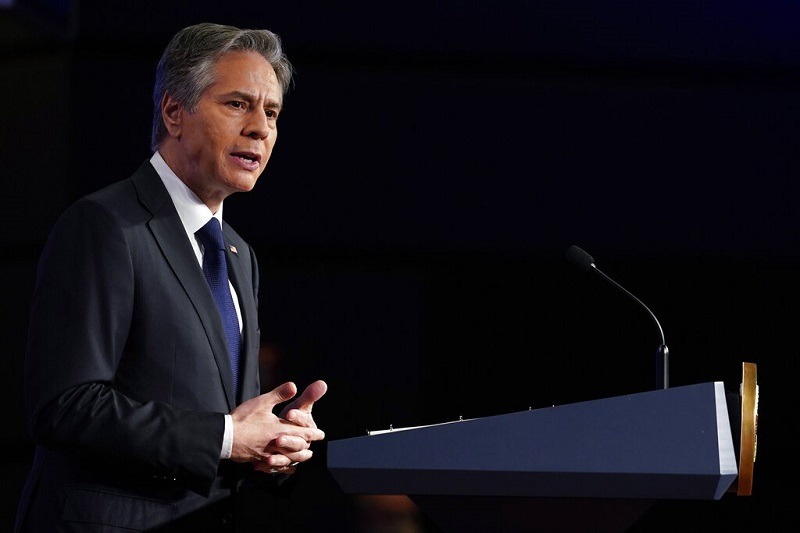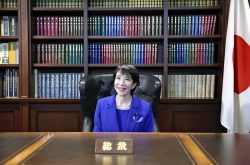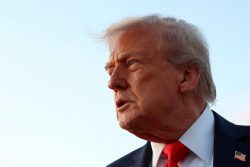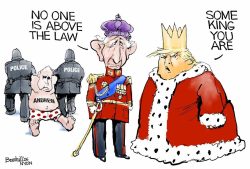
Secretary of State Antony Blinken speaks at George Washington University in Washington, Thursday, May 26, 2022
13:20 JST, May 27, 2022
WASHINGTON (AP) — Secretary of State Antony Blinken said Thursday the Biden administration aims to lead the international bloc opposed to Russia’s invasion of Ukraine into a broader coalition to counter what it sees as a more serious, long-term threat to global order from China.
In a speech outlining the administration’s China policy, Blinken laid out a three-pillar approach to competing with Beijing in a race to define the 21st century’s economic and military balance.
While the U.S. sees Russia and Russian President Vladimir Putin’s war in Ukraine as the most acute and immediate threat to international stability, Blinken said the administration believes China poses a greater danger.
“Even as President Putin’s war continues, we will remain focused on the most serious long-term challenge to the international order — and that is the one posed by the People’s Republic of China,” Blinken said.
“China is the only country with both the intent to reshape the international order — and, increasingly, the economic, diplomatic, military, and technological power to do it,” he said. “Beijing’s vision would move us away from the universal values that have sustained so much of the world’s progress over the past 75 years.”
Thus, Blinken laid out principles for the administration to marshal its resources, friends and allies to push back on increasing Chinese assertiveness around the world. Although he made clear that the U.S. does not seek to change China’s political system, rather it wants to offer a tested alternative.
“This is not about forcing countries to choose, it’s about giving them a choice,” he said.
However, he also acknowledged that the U.S. has limited ability to directly influence China’s intentions and ambitions and will instead focus on shaping the strategic environment around China.
“We can’t rely on Beijing to change its trajectory,” Blinken said in the speech, delivered at George Washington University. “So we will shape the strategic environment around Beijing to advance our vision for an open and inclusive international system.”
Blinken’s address was delivered overnight in China, and there was no immediate reaction to the speech from the Chinese embassy in Washington.
The speech followed President Joe Biden’s just-concluded visits to South Korea and Japan, where China loomed large in discussions. Biden raised eyebrows during that trip when he said that the United States would act militarily to help Taiwan defend itself in the event of an invasion by China, which regards the island as a renegade province.
The administration scrambled to insist that Biden was not changing American policy, and Blinken restated that the U.S. has not changed its position. Blinken said Washington still holds to its “One China” policy, which recognizes Beijing but allows for unofficial links with and arms sales to Taipei.
“Our approach has been consistent across decades and administrations. The United States remains committed to our ‘One China’ policy. We oppose any unilateral changes to the status quo from either side,” he said, adding that “we do not support Taiwan independence.”
Blinken said that while U.S. policy on Taiwan has remained consistent, China’s had become increasingly belligerent.
He made the case that the global response to Putin’s invasion of Ukraine can serve as a template for dealing with China’s efforts to mold a new and unpredictable world order to replace the rules and institutions that have guided relations between states since the end of World War II.
China, Blinken said, has benefited greatly from that international order but is now trying to subvert it under the leadership of President Xi Jinping and the Chinese Communist Party.
“Rather than using its power to reinforce and revitalize the laws, agreements, principles, and institutions that enabled its success, so other countries can benefit from them, too, Beijing is undermining it,” Blinken said. “Under President Xi, the ruling Chinese Communist Party has become more repressive at home and more aggressive abroad.”
Yet, Blinken also decried the rise in anti-Chinese and anti-Asian hate crimes in the United States, saying Chinese Americans and other Asian Americans have the same claim to the U.S. as any other immigrants or their descendants.
Investment in domestic U.S. infrastructure and technology along with stepping up diplomatic outreach to potentially vulnerable countries are other elements of the policy and are key to the U.S. approach, Blinken said.
In the latest manifestation of China’s push to expand its reach that has drawn concern from the U.S. and other democracies, Chinese Foreign Minister Wang Yi on Thursday began an eight-nation tour of Pacific islands during which Beijing hopes to strike a sweeping agreement that covers everything from security to fisheries.
Wang opened his tour in the Solomon Islands, which last month signed a security cooperation pact with China that some fear could lead to a Chinese military presence there. The agreement was finalized shortly after the Biden administration announced it would open a U.S. embassy in the Solomons as part of its efforts to engage in the greater Indo-Pacific region.
The Biden administration has largely kept in place confrontational policies toward China adopted by its predecessor in response to Chinese actions in its western Xinjiang region, Hong Kong, Tibet and the South China Sea.
And, while the administration sees areas for working with Beijing, such as combatting climate change, it will not trade cooperation for compromising on its principles regarding human rights and rule of law, Blinken said.
Top Articles in World
-

Israeli Ambassador to Japan Speaks about Japan’s Role in the Reconstruction of Gaza
-

Videos Plagiarized, Reposted with False Subtitles Claiming ‘Ryukyu Belongs to China’; Anti-China False Information Also Posted in Japan
-

North Korea Possibly Launches Ballistic Missile
-

Chinese Embassy in Japan Reiterates Call for Chinese People to Refrain from Traveling to Japan; Call Comes in Wake of ¥400 Mil. Robbery
-

Pentagon Foresees ‘More Limited’ Role in Deterring North Korea
JN ACCESS RANKING
-

Japan PM Takaichi’s Cabinet Resigns en Masse
-

Japan Institute to Use Domestic Commercial Optical Lattice Clock to Set Japan Standard Time
-

Israeli Ambassador to Japan Speaks about Japan’s Role in the Reconstruction of Gaza
-

Man Infected with Measles Reportedly Dined at Restaurant in Tokyo Station
-

Man Infected with Measles May Have Come in Contact with Many People in Tokyo, Went to Store, Restaurant Around When Symptoms Emerged





















